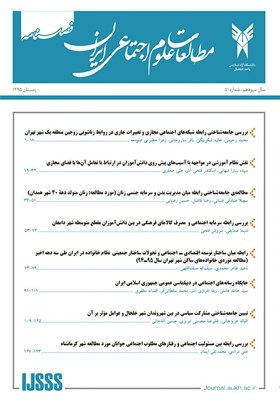نقش عوامل فردی تأثیر گذار بر ارتقاء فرهنگ کار (بررسی مقایسهای بین ایران و پنج کشور آسیایی)
محورهای موضوعی : خانواده
1 - دکتری جامعهشناسی، واحد تهران مرکزی، دانشگاه آزاد اسلامی، تهران، ایران
کلید واژه: خلاقیت, سلامتی, تحصیلات, فرهنگ کار, احساس آزادی,
چکیده مقاله :
مبنای تمدن و توسعه بر پایه کار و اندیشه انسانی بنا شده است، بنابراین شناخت نوع و ویژگیهای فرهنگ کارجوامع حائز اهمیت است. پرسش اصلی ما یافتن رابطه متغیرهایی مانند جنسیت، سلامتی، شادابی و نشاط، احساس آزادی، تحصیلات و خلاقیت با فرهنگ کار در ایران است. مقایسه این شاخص ها در پنج کشور، چین، ژاپن، مالزی و ترکیه با ایران به ارزش و کیفیت کار این تحقیق افزوده است. روش بررسی در این مقاله بصورت تلفیقی یعنی تاثیر عوامل خرد و کلان وتحلیل ثانویه ای از آمارهای "بررسی ارزش های جهانی "است. عوامل اثرگذار بر متغیر وابسته با روشهای رگرسیون خطی و لجستیک، میانگین، انحراف معیار، آزمون تجزیه واریانس، آزمونF، سطح معناداری و ضریب تعیین مورد بررسی و تحلیل قرار گرفته اند. از میان متغیرهای تاثیر گذار بر فرهنگ کار خلاقیت بیشترین تاثیر را در همه کشورها دارد، تاثیر همه متغیرهای مستقل به جز تحصیلات بر فرهنگ کار مثبت است. نتایج آزمون ها فرهنگ کار ایران را در مقایسه با چهار کشور دیگر بطور چشمگیری پایین تر نشان می دهد و برپایه پژوهش مذکور مهم ترین عامل تاثیرگذار برفرهنگ کار کاهش سرمایه اجتماعی و عدم احساس آزادی در زندگی فردی و اجتماعی که تاثیر بر شاخص هایی مانند شادابی و سلامتی، خلاقیت و نوآوری در کار و تولید است.
The principles of civilization and development will be held on work and human thought. Therefore, knowing all kinds and features of work cultures could be an important issue. The main question is finding the relation between some variables such as sexuality, health, happiness, freedom, education and creativity with work culture in Iran. Comparison between these variables in five different countries like Iran, china, japan, Malaysia and turkey could be add some positive value to this research. Research methodology on this research was a combination between minor and major issues on work ethics. The result of this investigation is Secondary analysis on global values. Some affecting factors such as the dependent variable linear and logistic regression methods, mean, standard deviation, variance analysis test, test, F, P and coefficient of determination were analyzed. Through all the factors, creativity is the most effective one. Influence of all the independent factors except academic degree could be positive on work ethics. Tests make it clear that work ethics in Iran compares to other four countries is significantly lower and based on the argument mentioned above the most important factors on work ethics would be decreasing the value of social capital and lack of feeling of freedom in either private or social life which could has serious effect on some factors such as happiness, health and creativity on work ethics and production
_||_


